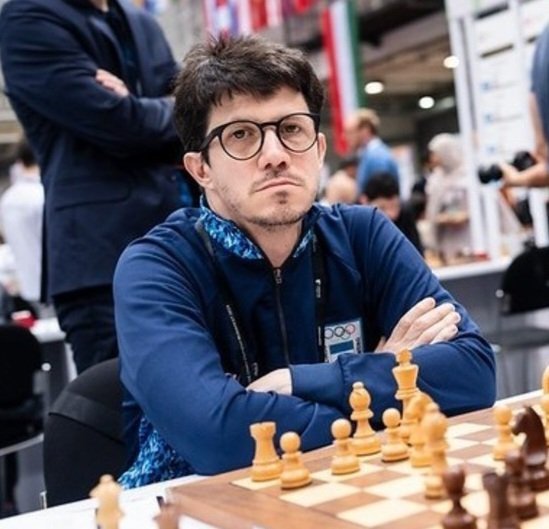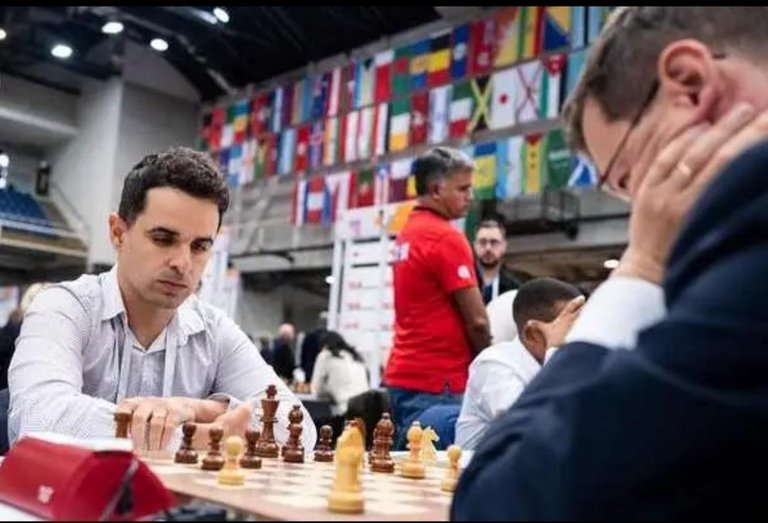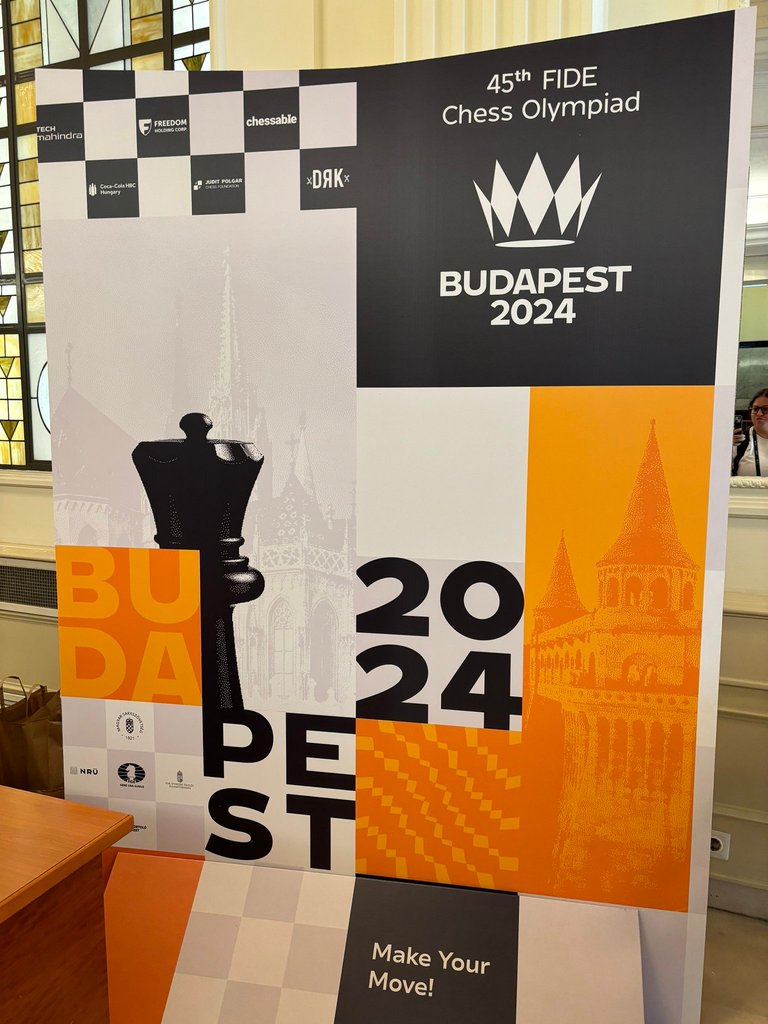
Esta secuencia podría aplicarse a cualquier deporte de competencia, no es ninguna novedad, salvo por el hecho de haberse dado en la misma partida en la misma competencia y solo con algunas horas de diferencia. Y no amigos, no fue en una competencia cualquiera sino en las 45avas. Olimpíadas de Ajedrez que se están disputando en estos momentos en Budapest, Hungría.
Y le ocurrió al GM argentino Diego Flores (ELO 2552), heptacampeón argentino, solo uno por detrás del inolvidable Miguel Najdorf.
¿Qué pasó en tan prestigioso torneo para que Flores ganara su partida, se la dieran por perdida y luego de la apelación volvieran a ponerlo como triunfador?
Todo por un chip de una empresa de telefonía local que tenía guardado y olvidado en su billetera.
Diego Flores acababa de finalizar con jaque mate su partida ante el MI boliviano Micael Ticona, algo sorprendente en ese nivel ya que no es habitual que un jugador continúe la partida hasta que el contrincante lo derrote por mate, pero el jugador boliviano continuó jugando mucho después de que su posición indicara que estaba absolutamente derrotado y aceptó de buena manera que ese movimiento culminante llegara a término. Flores declaró posteriormente que le sorprendió la actitud de Ticona, jamás le había ocurrido en 9 olimpíadas que ha disputado representando a su país.

Hasta allí todo normal, sin embargo, al finalizar la partida el árbitro del match le avisa a Flores que le toca el control antidoping que en realidad es un control anticheating, es decir una búsqueda de elementos electrónicos que pudieran haber ayudado al jugador en la partida. En ese procedimiento le encuentran al GM argentino un chip de teléfono celular en su billetera, fue suficiente como para quitarle la victoria y así se puso en los resultados oficiales. Inmediatamente el capitán del equipo argentino, el gran maestro estadounidense Robert Hungaski, inició el proceso de apelación, el argumento fue sencillo, no hay forma de tener comunicación entre un chip de telefonía y una persona a menos que haya un teléfono de por medio u otro componente que lo reemplace, además el chip tiene similar tecnología a la de los chips que se encuentran colocados en las tarjetas de crédito, en ese caso todos los que portaran al menos una en sus billeteras también serían sospechosos de hacer trampa. Finalmente, las autoridades concluyeron en que un chip de telefonía no es un dispositivo electrónico.
La apelación dio sus frutos y unas horas después el resultado retornó a cómo debía ser y Diego Flores volvió a tener ganada su partida.

En la ronda siguiente el GM argentino tuvo una de sus más grandes satisfacciones en estas olimpíadas, le ganó al GM cubano nacionalizado estadounidense Leinier Domínguez, 13° en el ranking, un jugador con más de 2700 puntos ELO. El argentino lleva cosechados en esta olimpíada 4 y 1/2 puntos producto de 4 victorias, 2 derrotas y un empate.
Las bromas del resto de los competidores respecto a lo ocurrido demuestran la camaradería reinante, ahora todos lo felicitan por haberle ganado a Domínguez, "y eso que no contaste con la colaboración del chip", agregan.
Win, lose and win again
This sequence could be applied to any competitive sport, it is nothing new, except for the fact that it occurred in the same game in the same competition and only a few hours apart. And no, my friends, it was not in just any competition but in the 45th Chess Olympiad that is currently being played in Budapest, Hungary.
And it happened to the Argentine GM Diego Flores (ELO 2552), seven-time Argentine champion, just one behind the unforgettable Miguel Najdorf.
What happened in such a prestigious tournament for Flores to win his game, to be declared lost, and after the appeal to be declared the winner again?
All for a chip from a local telephone company that he had saved and forgotten in his wallet.
Diego Flores had just finished his game against Bolivian IM Micael Ticona with checkmate, something surprising at that level since it is not usual for a player to continue the game until his opponent defeats him by checkmate, but the Bolivian player continued playing long after his position indicated that he was defeated and he accepted with good grace that this last, culminating move had come to an end. Flores later declared that he was surprised by Ticona's attitude; it had never happened to him in 9 Olympiads that he has participated representing his country.
So far, everything was normal. However, at the end of the match, the referee notified Flores that he had to undergo an anti-doping test, which was an anti-cheating test, that is, a search for electronic elements that could have helped the player in the match. During this procedure, the Argentine GM found a cell phone chip in his wallet, which was enough to take away his victory and thus was included in the official results. Immediately, the captain of the Argentine team, the American grandmaster Robert Hungaski, began the appeal process. The argument was simple: there is no way to have communication between a telephone chip and a person unless there is a telephone or another component that replaces it. In addition, the chip has similar technology to the chips found in credit cards, in which case all those who carried at least one in their wallets would also be suspected of cheating. Finally, the authorities concluded that a telephone chip is not an electronic device.
The appeal bore fruit and a few hours later everything returned to how it should be and Diego Flores won his game again.
In the next round, the Argentine GM had one of his greatest satisfactions in these Olympics, he beat the Cuban GM naturalized American Leinier Dominguez, 13th in the ranking and a player with more than 2700 ELO points. The Argentine has collected 4 and 1/2 points in this Olympiad, the result of 4 wins, 2 losses, and 1 draw.
The jokes of the rest of the competitors regarding what happened demonstrate the prevailing camaraderie, now everyone congratulates him for having beaten Domínguez, "and that's without the help of the chip," they add.
Héctor Gugliermo
@hosgug
